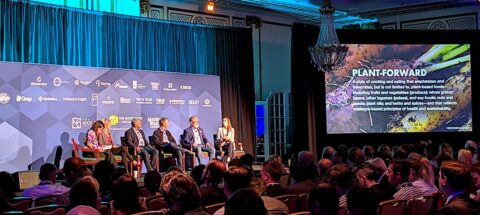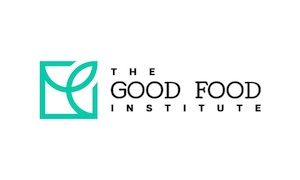Fact Check
Fact-Checking Claims Made About Oklahoma’s Lawsuit Against Tyson Foods
Food•5 min read
Perspective
Bruce Friedrich, Executive Director and Co-Founder of The Good Food Institute, discusses the organization's mission to transform the world's food system.

Perspective • Farms • Food

Words by Site Admin
The Good Food Institute (GFI) is one of the most exciting and impactful organizations making a positive difference for the animals at the moment – and not just animals, but the health of the planet and the humans on it, too. With a focus on fixing the broken food system that is pathologically addicted to intensive factory farming, The Good Food Institute is making progress with championing and accelerating the development of both plant-based and cultivated alternatives to animal products. GFI has been named a Top Charity by Animal Charity Evaluators for the fourth year running.

Sentient Media: Why are you doing what you do? What is it about your organization’s mission that most resonates with you?
Bruce Friedrich: My life’s mission is to make a maximum positive difference in the world. The current climate crisis, the end of modern medicine through antibiotic resistance, food insecurity that has led to malnutrition for millions of people, and the exploitation of animals for food: each of these is a worthy issue to tackle for anyone who wants to make the world a better place, and each of these is rooted in our current food system. I have been thinking about these issues myself for more than 30 years, since I received my undergraduate degree in economics with a focus in agricultural economics. I became concerned about how developed world agricultural policies are affecting developing world economies and peoples, the global ecosystem, and animal welfare. All aspects of The Good Food Institute’s mission resonate with me, and the fact that we can reform the global food system in a way that has positive consequences across the range of external costs attributable to industrial animal agriculture causes me to feel that there is nowhere that I could be doing more good in the world than at GFI.
Sentient Media: Is there a specific moment in your past that was pivotal to your interest in this cause? What experiences have shaped your advocacy the most?
Bruce Friedrich: In 1987 I was running an organization called Poverty Action Now at my small liberal arts campus in Iowa and was very interested in global economic policies that were adversely impacting people in developing countries. I read Diet for a Small Planet by Frances Moore Lappé, and it was a turning point for me. The numbers have changed since it came out in the early 1970s, but the basic argument holds true: that funneling food through animals is vastly inefficient and environmentally catastrophic, that it leads to global starvation, and that we need a systems shift away from industrial animal agriculture and toward eating plants instead. GFI is the answer to Lappé and Diet for a Small Planet. It recognizes that the more money people have, globally, the more likely they are to eat more meat, but the meat does not have to be a product of the inefficient processes of industrial animal agriculture. We can biomimic meat from plants and we can grow meat directly from cells, which will require a fraction of the inputs, cause a fraction of the adverse environmental impacts, not require antibiotics at all, and remove animals from the equation entirely. GFI’s theory of change was directly inspired by Diet for a Small Planet, and I see that book as my pivotal turning point.
Sentient Media: How has the world changed for the better in the time you have been working with the cause?
Bruce Friedrich: People care more. The environmental crisis is making headlines, with climate change and water shortages receiving particular concern and attention. The World Health Organization has said that, on our current trajectory of antibiotic resistance, we’re looking at the end of modern medicine within our lifetimes, and people are paying attention to that. People also care more about animal welfare. And most importantly, we have found a solution that allows people to continue to make dietary choices on the basis of price and taste by making the products that they want less harmful. We can and should encourage people to make dietary changes, but at the end of the day, the way that we have a global impact is to think about a global solution. And the only tenable global solution is to make meat from plants and grow it directly from cells. We’ve already seen an astronomical shift in thinking about this field, such that meat companies like Tyson Foods, Hormel, and Perdue, are moving in this direction, and there are dozens of startups all over the world with super smart and mission-driven entrepreneurs. It’s been tagged by everybody from former Google CEO Eric Schmidt to the Bill and Melinda Gates Foundation as a solution to these really big problems.
“We can and should encourage people to make dietary changes, but at the end of the day, the way that we have a global impact is to think about a global solution.”
Sentient Media: What are the most important ways your organization seeks to make a positive impact in the world?
Bruce Friedrich: The Good Food Institute is a global nonprofit building a more sustainable, healthy, and just food system. Our scientists, entrepreneurs, lawyers, and policy experts are harnessing the power of food innovation and markets to accelerate the transition of the world’s food system to plant-based and cellular agriculture.
We do this through three key programmatic areas: corporate engagement, science & technology, and policy. Our Corporate Engagement Team builds collaborative relationships with the largest food processing companies, chain restaurants, and grocery stores to maximize the availability, quality, quantity, and promotion of plant-based and cultivated meat. Our Science and Technology Team are the leading experts on the cutting-edge science of alternative proteins. They analyze the state of the industry, identify top research opportunities, engage scientists and engineers from academia and industry, and mobilize funding to accelerate the industry. Along with Corporate Engagement, they also bring people together to form new companies and connect these new companies to expertise and funding. Our Policy Team works closely with legislators and regulators to ensure a clear and efficient path to market for cultivated meat. They also work on the federal and state levels to ensure that plant-based meat can compete on a level playing field. Finally, they work to secure R&D funding for alternative proteins from governments and funding institutions.
GFI does all of the above not only in the United States, but also through our five affiliates in Asia-Pacific, Brazil, Europe, India, Israel, and in collaboration with partners in a growing number of countries around the world. We are trying to accelerate the delivery of sustainable protein globally as quickly as possible.
Sentient Media: What is a success story, such as a campaign, that you would like to share, and why?
Bruce Friedrich: We have had phenomenal successes across our three programmatic areas, to the extent that it’s difficult to pick just one. Our 2018 Year in Review provides a great overview of our work last year, as do the 2017 Year in Review and 2016 Year in Review for previous years. Anyone interested in learning more can sign up for our monthly reports, which are packed with achievements and accomplishments, by emailing me at [email protected].
Sentient Media: What are your big plans for the future? What change are you excited to be driving next, and how? How are you maximizing the impact for the animals?
Bruce Friedrich: The great thing about GFI’s mission is that we are maximizing impact for the environment, global health, and food security in addition to animals. We’re doing that in part by mobilizing governments and massive corporations, neither of which care a tremendous amount about animals, but care about climate change, human health, and food safety. By doing this, we are expanding the support base and building capacity in this field. We are also very excited to be diligently focused on our goal-setting and tracking system, which is based on Google’s. We have six objectives, four to seven key results under each objective, and actions under each key result. This system keep us focused on our north star: harnessing the power of food innovation and markets to create a sustainable, healthy, and just food system.
If you want to support GFI’s work in transforming the global food system, consider making a donation to them here.